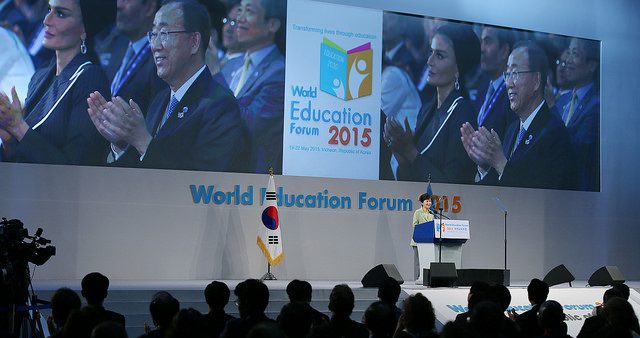A declaration providing political support for the post-2015 education agenda, including goals to achieve universal pre-primary, primary and secondary education of good quality, has been endorsed by Education Ministers and officials from across the world, says Oxfam in a press release.
In Incheon, Deepak Xavier, Essential Services spokesperson for Oxfam, said:
“This is a visionary, comprehensive agenda for education for the next 15 years. Rather than following the lead of some donors who are pushing for education to be privatized, this declaration comes out strongly in favor of quality public education for all children, free-of-charge.”
“The ‘development fad’ of low-cost private schools and privatization has caused us to lose ground on the hard-fought progress in abolishing school fees over the last 15 years. Donors must not rely on private finance to resource this agenda as too often private finance simply means poor families forced to pay school fees.”
Oxfam: Find penge i skattehullerne
“This agenda is useless unless it is backed up with real money. If we have any hope of achieving education for all children, governments meeting in July in Addis Ababa must make bold new commitments to stem international tax dodging and increase aid to education. Oxfam has calculated that developing countries could be losing US$100 billion each year to corporate tax dodging, enough to fill the global education financing gap almost 5 times.“
“While education ministers from Southern countries demonstrated their own commitment to do everything in their power to meet these goals, rich countries showed their ambivalence about global education by failing to send their Ministers.”
Uddannelse mod religiøs fundamentalisme
Education Minister of Burkina Faso, Samadou Coulibaly, at the Forum, said:
“I witness how so many high ranking officials and Ministers are participating in the forum, but the Ministers from most donor countries are absent. The donors’ commitment to initiatives like the Global Partnership for Education has been reducing over the years. I fear their absence may be a signal that there will be lesser resources to address education inequality in the developing world.
“Our region is witnessing a rise in religious fundamentalism. If this region doesn’t get sound support for education, the entire African continent is going to suffer.”
Helle Gudmandsen (fra den danske organisation IBIS, red.), Board Member of Global Campaign for Education (GCE), said:
“The declaration and framework for action is very important for the future of education globally. We agree with the Education Minister of Burkina Faso that the absence of Ministers from donor countries could be seen as their commitment to resourcing the education agenda declining. This will have long-term negative consequences both in the developing as well as the developed world.
Læs mere om World Education Forum på konferencens hjemmeside.















